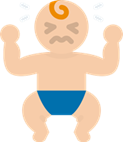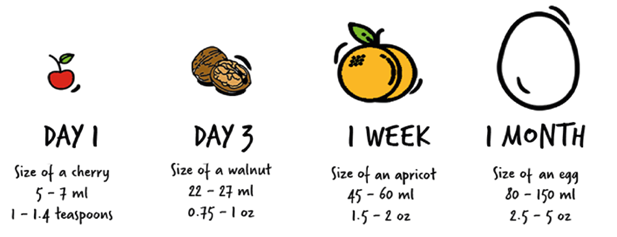By following their lead, your baby will tell you when they are hungry and when they are full up. This is called responsive or paced feeding.
Making eye contact and talking or singing to them during feeds, holding your baby close and feeding whilst skin to skin will help your baby feel safe, loved and secure.
Being able to recognise your baby's feeding cues will mean you can feed them when they first show signs of being hungry. Let your baby feed a their own pace, taking a break when they need to and stopping when they are full. It is ok for your baby not to drink all of a bottle at every feed.
Common Feeding Cues
Below are some common feeding cues. Click the picture for more information.
Hunger Cues
Your baby shows you cues to let you know when they are hungry. These cues get stronger as they get hungrier until they cry as a last signal to you.
As you come to know your baby, you'll start to notice their personal feeding cues. Here are some common cues to look out for:
 Mouth movements, including smacking or licking their lips
Mouth movements, including smacking or licking their lipsTop Tips
 of being hungry.
of being hungry.Babies have very tiny tummies and because of this will feed little and often for quite some time after they are born. Look at the image below to see how much milk your baby's tummy can take.

Formula feed tubs or cartons will often give a recommended amount of milk for the age of your baby. We recommend using responsive/paced feeding so your baby can let you know when and how much they want to feed.
If your baby drinks more than their tummy can hold, they may bring some milk back up or appear uncomfortable and unsettle after the feed.
Wet and dirty nappies are the best indicator that your baby is receiving enough milk. They should have around 6 wet nappies a day from a few days after the birth. Nappies should be soaked through with clear or pale yellow urine, or feel heavy.
Other signs that your baby is getting enough milk and is well are;
If you would like to weigh your baby, local libraries offer self weigh facilities.
Skin to Skin & Bonding
All babies, breast or formula fed enjoy skin to skin, and all babies get the same positive benefits of this bonding experience. Don't forget, skin to skin is a great way for baby to bond with dads, partners or other carers too.
There are lots of benefits from spending time with your baby skin to skin:
When you're out and about, slings can help as babies love being close to you and you can still have your hands free. If you would like to use a sling but don’t want to buy one why not use a local sling library.
Keeping Baby Safe
When bottle feeding your baby there are some things that you need to remember to keep your baby safe.
Don't 'prop feed' your baby. This means propping up the bottle with a blanket or other object so they can drink unaided. This carries a high risk of choking and is very dangerous. It can also increase the risk of tooth decay even in teeth that you can't see yet and ear infections due to milk pooling in the mouth.
Follow the responsive/paced feeding advice and keep your baby's head upright, higher than their feet when they are feeding. Remove the bottle at regular intervals so they can take a breath.
A Product Safety Alert for baby self-feeding pillows and prop feeders presenting a risk of serious harm or death has recently been issued (2022). Consumers, local authority trading standards and businesses are asked to take specific action to cease use or remove them from the market.
If your baby is less than 28 days old you can contact your local midwifery team or you can contact the Healthy Child Programme at any time following your baby's birth by calling Just One Number on 0300 300 0123 or texting Parentline on 07520 631590.
Our opening hours are 8am-6pm Monday to Friday (excluding bank holidays) and 9am-1pm on Saturdays.
Norfolk Healthy Child Programme has a team of infant feeding champions who can contact you by video call/telephone initially to discuss your questions and refer you to further help if required. All of our staff are trained to Unicef standards to provide you with the best possible breastfeeding support and advice.
It may help in the first instance to read the Essential Guide to Feeding & Caring for your Baby.
Norfolk’s Early Childhood and Family Service (ECFS) offers support for all parents and carers with children aged 0 to 5 years.
To speak to other Norfolk parents and carers, you can join our online community forum below.
Also in this section...